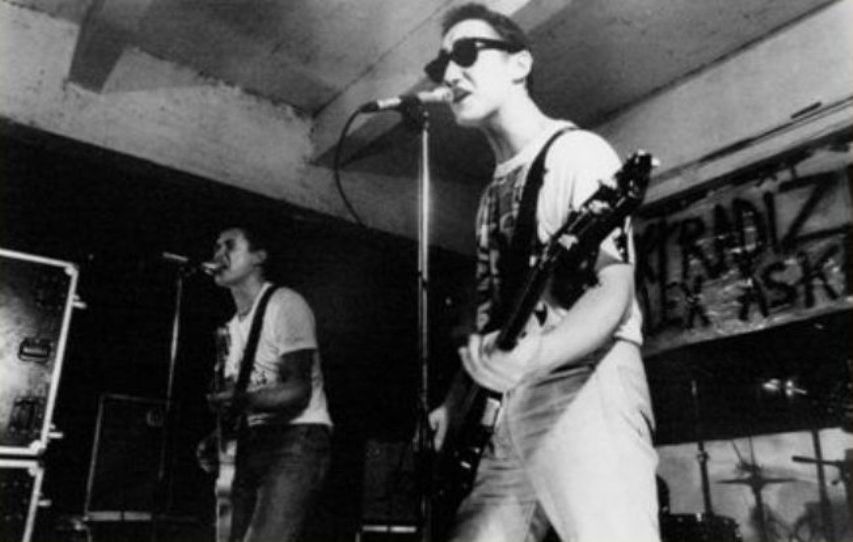Basque Radical Rock

Basque Radical Rock, or Rock Radikal Vasco was a musical movement born in the Southern Basque Country at the beginning of the 1980s. It ended in the last years of the decade. It gathered different style music bands, like punk, rock or ska, but with very special punk influences. It was very influenced by bands like Sex Pistols, The Ramones or The Clash.
The name Basque Radical Rock was first used in 1983 in an article published in the newspaper Egin signed by José Mari Blanco (ex manager of the band La Polla Records), after a music festival against the Spanish adhesion to the NATO. [1] The concept BRR was very controversial from the beginning. Despite being Basque nationalists, some bands felt manipulated and denied the label by considering it commercial. The band (Eskobuto) nevertheless, claimed that "Rock does not have any fatherland".[2][3]
The sign that united all those bands was their social and political criticism and the high number of the lyrics criticising organizations in power: The Spanish state, the police, the Spanish monarchy, the Roman Church, the military, the bullfights and the Guardia Civil are some examples. Together with the free radios, fanzines, squat houses and some alternative groups, the movement surrounding the left independentist political party Herri Batasuna backed the movement. Herri Batasuna in a campaign called Martxa eta Borroka (Rhythm and Fight) began organizing rock concerts and political rallies at the same time. This helped the bands spread their music in the whole Basque Country. Moreover, thanks to the championships organized by the newspaper Egin, many bands got to know. Some of them would reach the highest levels of the movement. For example: La Polla, Hertzainak, Potato, Kortatu, RIP, Barricada and Cicatriz.
History

The birth of the movement
Despite not having the label Basque Radical Rock, in the Basque Country there were some radical trace bands. Nevertheless, their influence was very reduced. In 1977 the first punk-rock bands were created in the Basque Country, mainly influenced by the rhythms coming from England. This bands were spread in the whole Basque territory and they had very little resources. Linked to the punk philosophy that someone does not necessarily need to know an instrument to play it, more bands were quickly created. Odio (Hate), Basura (Trash), Vulpess, Optalidon, Cirrosis or RIP were some of the first bands.
In the 1980s, when the movement grew stronger, these were the bands that had the most followers, and consequently, drove the movement ahead: Hertzainak, La Polla Records, Zarama, MCD, Eskorbuto, Barricada, RIP, Kortatu, Vómito and BAP!!. The Basque Radical Rock hardly had any effects in the Northern Basque Country.
Campaigns and championships

The newspaper Egin -and especially the journalist Pablo Cabeza- had a big influence on spreading the BRR. The promoters of the movement used the music section of the newspaper to promote these bands' names and their phylosophy. They also organized a championship (Egin Rock Txapelketa) to choose which were readers' favourite music bands in the Southern Basque Country. The final of the championship was held in the football stadium of Gasteiz and gathered thousands of punk fans. The most voted bands of each territory played there: RIP (Gipuzkoa), Hertzainak (Araba), Barricada (Nafarroa) and Zarama (Bizkaia).
The gaining of social support and the increasing number of concerts had big impact in a short period of time, and the movement that was somehow marginal and supported by few people became the confluence of thousands of Basque people. Many of the concerts were linked to the Basque liberation movement and that is why many were supporting ETA prisoners, Nicaragua, ikastolas or Basque language schools, local squat houses or free radios, or againts the military service .
Musically it was not an homogeneus movement. Different music styles were played under the RRV letters. For example, Barricada played rock, Kortatu or Hertzainak ska and punk, Potato reggae, Vomito dark rock and La Polla Records or Cicatriz punk-rock. It was the attitude rather the music what linked all these groups.
The movement became known outside the Basque Country. Many groups played concerts in Europe or South America, mainly those who sang in Spanish. Nevertheless, bands singing in Basque like Kortatu, Hertzainak or Jotakie played in Germany, the Netherlands, Italy, Britanny, Spain or in France. It is mencionable the macrofestival held in Barcelona (Catalonia) in November 1985 under the name of Basque Rock. RIP, Hertzainak (who finally could not participate because of some troubles they had with the Spanish police), La Polla Records, Kortatu and Cicatriz gathered more than 10.000 people.
From Spanish to Basque

Spanish was the main language of the movement, and the first bands singing in Basque were Hertzainak and Zarama. Despite the fact they were born in very different areas, they both took the same decision: To make punk in the Basque Country, the band had to sing in Basque. That is why, the singers of both bands (Xabier Montoia of Hertzainak (who later would create M-ak) and Roberto Moso of Zarama both decided to learn the language.
There are also some groups who switched from Spanish to Basque. The most evident is the case of Kortatu. After publishing the first discs only in Spanish, they evolved little by little inserting more and more songs in Basque to finish with their last disc Kolpez Kolpe only in Basque. Danba and BAP!! had a similar evolution.
References
- ^ F-M Hop: «Música vasca: un poco de historia», en el dosier about Basque music by La Factoría del Ritmo: march-july, 1996.
- ^ Interview with Eskorbuto
- ^ Interview with Eskorbuto
